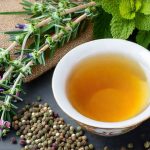Urethral discomfort can be a surprisingly common experience, often stemming from irritation, inflammation, or sensitivities within the urinary tract. While conventional treatments are readily available, many individuals seek gentler, more holistic approaches to manage mild symptoms and support overall urinary well-being. Herbal remedies have been used for centuries to address various health concerns, and increasingly, there’s growing interest in utilizing the soothing properties of specific plants—particularly those rich in mucilage—in the form of teas designed to offer comfort and potentially ease urethral irritation. It’s important to acknowledge that this is an area where self-treatment should be approached with caution and always alongside professional medical guidance, but understanding the potential benefits of these botanicals can empower individuals to explore complementary care options.
This exploration isn’t about finding a ‘cure’ for underlying conditions; rather it’s about leveraging natural compounds found in plants to create supportive beverages that may help soothe discomfort. The focus here is on teas formulated with mucilaginous plants – those containing a slippery, gel-like substance – because this unique characteristic offers a protective and calming effect on irritated tissues. We will delve into the specific properties of these plants, how they interact with the urinary system, and provide guidance on responsible use. Remember that individual responses to herbal remedies can vary greatly, making personalized approaches and careful observation essential.
The Science Behind Mucilage & Urethral Support
Mucilage is a complex carbohydrate produced by many plants as a protective mechanism. Think of it like the plant’s natural bandage – it provides a barrier against harsh environments and helps retain moisture. When ingested, mucilage coats and soothes inflamed tissues, offering a physical layer of protection. In the context of urethral discomfort, this coating can potentially reduce irritation caused by urine flow or sensitivity to external factors. The key difference between simply drinking water and consuming mucilaginous teas is this added protective element. It’s not about increasing hydration (though staying hydrated is crucial!) but providing targeted soothing action.
Several plants are particularly renowned for their high mucilage content, making them ideal candidates for urethral-soothing tea blends. Marshmallow root (Althaea officinalis) is perhaps the most well-known example, boasting a substantial amount of this beneficial substance. Slippery elm bark (Ulmus rubra) also contains significant levels of mucilage and has been traditionally used for digestive and respiratory ailments but its soothing qualities extend to other mucous membranes. Finally, flaxseed (Linum usitatissimum), beyond its nutritional benefits, provides a moderate amount of mucilage that contributes to the overall calming effect. These plants don’t ‘fix’ the issue, they help create an environment where tissues can potentially heal and irritation is minimized.
The mechanism isn’t simply about coating the urethra. Mucilage also helps to modulate inflammation. While not anti-inflammatory in a strong medicinal sense, its protective barrier reduces further irritation, allowing the body’s natural healing processes to take over more effectively. It’s important to reiterate that this is often best used as supportive care and should never replace medical diagnosis or treatment. Understanding these nuances helps to set realistic expectations when incorporating mucilaginous teas into a wellness routine.
Popular Plants for Urethral Soothing Teas
Marshmallow root stands out as the premier choice for urethral support due to its exceptionally high mucilage content, often exceeding 30%. It has been used traditionally for centuries to soothe inflamed tissues and is incredibly gentle on the system. Preparing marshmallow root tea differs slightly from other herbal infusions; cold infusion is preferred because hot water can degrade some of the beneficial compounds. This involves soaking the dried root in cool or room temperature water for several hours, ideally overnight. The resulting liquid will have a slightly viscous texture due to the released mucilage.
Slippery elm bark offers similar benefits, though its flavor profile is distinct – somewhat earthy and subtly sweet. It’s also readily available in powdered form, making it convenient for tea preparation. While hot water can be used with slippery elm, limiting the brewing time (around 10-15 minutes) helps to preserve more of its mucilage content. Combining marshmallow root and slippery elm bark in a blend creates a synergistic effect, maximizing the soothing properties.
Flaxseed, although containing less mucilage than the other two, adds another layer of support and offers additional nutritional benefits. It’s often included in tea blends for its gentle texture and mild flavor. However, it’s crucial to use whole flaxseeds rather than flaxseed meal (ground seeds) as the ground form can absorb too much water and create a less palatable consistency. The combination of these three plants allows for a well-rounded approach to creating a truly soothing tea.
Brewing & Preparation Guidelines
Creating effective urethral-soothing teas involves more than just throwing herbs into hot water. Proper brewing techniques are essential to maximize mucilage extraction and ensure optimal benefits. Here’s a step-by-step guide:
- Source Quality Herbs: Always choose organic, sustainably sourced herbs from reputable suppliers. This ensures you’re getting the purest, most potent ingredients.
- Cold Infusion for Marshmallow Root: For marshmallow root specifically, combine 1-2 tablespoons of dried root with 8 ounces of cool water. Allow to steep overnight (at least 4-8 hours).
- Gentle Heat for Slippery Elm & Flaxseed: Use approximately 1 teaspoon of slippery elm bark powder and ½ teaspoon of whole flaxseeds per cup of water. Brew for 10-15 minutes, avoiding boiling.
- Strain Thoroughly: Strain the tea through a fine-mesh sieve or cheesecloth to remove any herbal residue.
- Enjoy Warm (Not Hot): Sip the tea warm—avoiding excessively hot temperatures which can potentially irritate the urethra.
It’s important to note that consistency is key. While one cup of tea may offer temporary relief, regular consumption (2-3 times daily) is more likely to provide sustained benefits. Pay attention to your body’s response and adjust the strength of the tea as needed. Additionally, consider adding a touch of honey or lemon for flavor, but avoid sweeteners that could potentially irritate the urinary tract.
Identifying Potential Sensitivities & Interactions
While generally considered safe, it’s crucial to be aware of potential sensitivities and interactions with other medications. Individuals with allergies to any plants in the Malvaceae family (which includes marshmallow root) should exercise caution or avoid using these teas altogether. Similarly, those taking medications that affect kidney function should consult their healthcare provider before incorporating herbal remedies into their routine.
- Digestive Considerations: Large amounts of mucilage can sometimes cause mild digestive upset, such as bloating or gas. Starting with smaller quantities and gradually increasing intake can help minimize this risk.
- Medication Interactions: Mucilaginous herbs may interfere with the absorption of certain medications. It’s best to take these teas at least an hour before or after taking any prescribed drugs.
- Underlying Conditions: Individuals with underlying kidney disease, diabetes, or other chronic health conditions should consult their healthcare provider before using herbal remedies.
Bold statement: Always prioritize professional medical advice over self-treatment. These teas are intended as a complementary approach to support overall well-being and should not be used as a substitute for conventional medical care. If symptoms persist or worsen, seek immediate medical attention.
Long-Term Support & Holistic Approaches
Urethral discomfort is often a symptom of an underlying issue—whether it’s infection, inflammation, sensitivity to certain products, or other contributing factors. Therefore, long-term support requires a holistic approach that addresses the root cause. This includes:
- Hydration: Drinking plenty of water helps flush out toxins and supports overall urinary health.
- Dietary Modifications: Avoiding irritants such as caffeine, alcohol, spicy foods, and acidic fruits can help reduce inflammation.
- Gentle Hygiene Practices: Using mild, fragrance-free soaps and avoiding harsh chemicals in the genital area is essential.
- Stress Management: Chronic stress can weaken the immune system and exacerbate inflammatory conditions. Practicing relaxation techniques such as yoga or meditation can help manage stress levels.
Integrating these lifestyle changes alongside the occasional consumption of urethral-soothing teas can provide comprehensive support for urinary health. Remember that consistency and mindful attention to your body’s signals are key. These herbal remedies offer a gentle, natural way to potentially ease discomfort and promote well-being, but they should always be viewed as part of a broader holistic approach to healthcare.
To further enhance hydration strategies, consider exploring mucilaginous herbal waters for additional support.
For a more comprehensive understanding of dietary adjustments that can benefit urinary health, review our guide to smart fluid intake patterns with each meal.
It’s also important to explore other soothing methods; you may find natural oils for urethral irritation helpful as a complementary approach.
Understanding the connection between diet and urinary health is crucial, so take a look at these flow-aware smoothie recipes with anti-inflammatory benefits to support your overall well-being.
Don’t underestimate the power of simple lifestyle changes; incorporating standing breaks for daily flow support can make a significant difference.
If you’re looking to refine your dietary choices, explore the benefits of gentle protein sources for men with flow issues as part of a holistic approach.
Finally, remember that proactive care is key; learn about resetting your flow system with gentle daily wins to maintain optimal urinary health.





















